Eva Burrows - born to lead
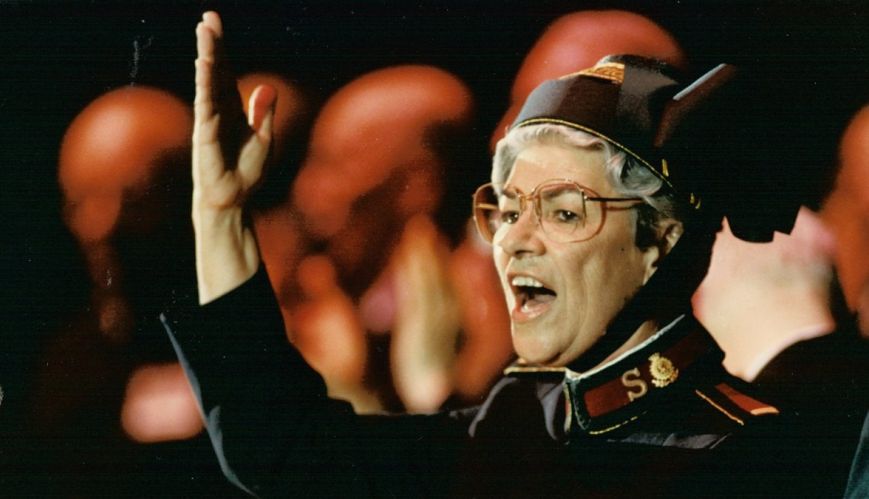
Eva Burrows - born to lead
Australia’s Eva Burrows served as General of The Salvation Army from 1986 to 1993.
Australian Salvation Army officer Eva Burrows achieved much in her remarkable time on earth, but it was her ability to remain connected to the people that made her one of the most important figures in the history of The Salvation Army.
Born on 15 September 1929 in the Newcastle suburb of Tighes Hill to Salvation Army officer parents Robert and Ella Burrows, Eva Burrows was to rise above the poverty-stricken world of the Great Depression to become the world leader of The Salvation Army. Although the family of nine children shared the poverty of the depression, Eva recalled: “My mother seemed to be an amazing person at making do, making many things out of nothing.” In spite of the constant change of locations due to her parents’ role as Salvation Army officers, Eva enjoyed school and did well, feeling that the constant relocation was an advantage rather than a hindrance. She recalls, “Sometimes it’s when you move from place to place – you’re pushed into being outgoing towards people, and I think that is never a disadvantage for a child.”
During her time at Brisbane State High School, her leadership skills became evident when she was elected the school captain. However, it was during this time and the following years at the University of Queensland that Eva began to turn away from her parents’ faith. “I just felt I couldn’t be bothered going to The Salvation Army because it was too strict,” she remembered. However, it was at university that God broke into her life, and she found herself attending a vacation Bible Camp run by the Christian Union.
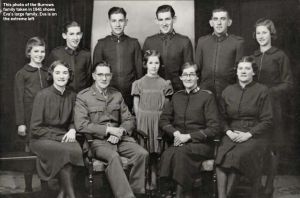 Eva Burrows as a child (far left) with her family in a photo taken in 1941.
Eva Burrows as a child (far left) with her family in a photo taken in 1941.
Eva returned to The Salvation Army. “I had a strong conviction,” she reflected. “I can only call it an inner awareness that The Salvation Army was the place where God wanted me to be.”
Attending a Salvation Army youth meeting, Eva felt the unmistakable and impelling call of God on her life and knelt at the mercy seat, totally surrendering her life to God. “I brought myself, and from that time on there was no question in my mind that my life was to be devoted to God, and within the orbit of The Salvation Army,” she said.
While attending a youth congress in England in 1950, Eva decided to enter Officer Training College in London with the idea that after being commissioned as a Salvation Army officer, she could follow her calling to be a teacher in Africa.
“I wanted to do something that cost me something,” she said. Following her commissioning as an officer, Eva spent a year at a specialised training course at university.
African years
In 1952, Eva arrived at the Howard Institute in Rhodesia (now Zimbabwe). It was a very large mission station, which had a boarding school, teachers’ college and theological college for African students. Eva first taught in the primary school and later trained local teachers. Here she was to experience first-hand the development of the education system in Zimbabwe. “In the 17 or so years that I was in Zimbabwe, I saw not only the development of education itself, but I saw the development of secondary education, mostly on the English Cambridge school level. So I saw a great development in education and the building of the university,” she said.
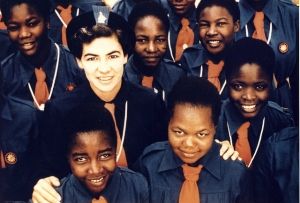 Eva Burrows as a young officer serving in Zimbabwe.
Eva Burrows as a young officer serving in Zimbabwe.
In 1967, Eva was appointed as the principal of the Usher Institute, a Teacher Training Centre in Zimbabwe. Her leadership skills were evident as she sought to expand the curriculum and academic competence of her students. Also during that year, she was a delegate to the International College for Officers in London, where her leadership abilities were noted by Salvation Army leaders.
A change in appointment from The Salvation Army in 1969 saw Eva leave Africa; a change she found difficult: “When I went to Africa, I thought I’d be there for the rest of my days. It was a grief experience. I was mourning inside myself ... I really felt that I was leaving part of myself behind.” However, the change was to expose her to a world view of The Salvation Army as the vice-principal of the International College for Officers in London, where Salvation Army officers from countries around the world came to further their training.
Eva’s experience in Africa was an ideal preparation for her new role: “I was the first staff member of that college who had actually served in the Third World, so that was a great advantage to me.” Her skills and insight soon saw her promoted to the principal of the college. When the time came for Eva to leave the college for a new appointment, Salvation Army leaders sought her advice on a replacement, as she suggested that she be replaced at the college with someone who had been in the Third World, someone who had mission experience.
New challenge
The new appointment, in 1975, was to oversee the Women’s Social Services in Great Britain and Ireland. In spite of her inexperience in this field, she found herself challenged by the task.
“Once I got there and started to have a look at the situation, I was really quite challenged to do something about it,” she recalled. Having seen what she thought was abject poverty in Africa, she found herself shocked by the extreme poverty in Britain, especially among women. “I just realised that here was a tremendous need, and The Salvation Army was trying to provide them with some love, some friendship, a place where they could meet other people and enjoy decent food and so forth.”
In January 1977, Colonel Eva Burrows found herself appointed as the Territorial Commander of Sri Lanka. Learning to live in Asia was a very different experience as she discovered the culture was quite different to Africa. “I then had to enter into another culture altogether and try and learn. I had to study more about religions because, unlike Africa, Sri Lanka is a country with long-established religious groups,” she said. Here she came to a deeper understanding of other faiths and also the responsibility of The Salvation Army to care for the people whom no one else wanted to care for. In a country where there were great political upheavals and natural disasters, Eva was able to give The Salvation Army a higher profile in setting up refugee camps and disaster relief.
In April 1977, Eva, because of her position, was summoned to the High Council. Aware of her comparative youth in relation to the other members of the council, Eva sought to keep a low profile. “I was very young, so I thought, ‘No, I’m just going to do the listening this time. I’ve got more High Councils coming up ahead’.”
November 1980 saw Eva appointed as the territorial commander in Scotland, a vast change from the tropical climate of Sri Lanka. In a sense, Eva felt akin to the Scots as her father had emigrated from there.
“I found the Christians in Scotland very energetic and vital Christians and enjoyed my fellowship with them in the Church of Scotland in particular.” However, soon after her arrival, Eva suffered a coronary and found herself in hospital. When she awoke in the intensive care unit, she found an African nurse sitting beside her and thought she was back in Africa. To her great surprise, the nurse turned out to be one of her students from the Usher Institute.
Home appointment
A call from General Jahl Wahlstrom was to totally change the direction of Eva’s ministry and send her across the other side of the world to Melbourne in her home country of Australia. The appointment as territorial commander in the Australian Southern Territory was to break new ground as the first woman territorial commander in Australia. Having been out of Australia for so long, Eva pondered whether her 30-year absence would be a cause for concern. Much to her relief, she soon discovered that within a few weeks, she “felt a real Aussie ... it was great”.
Eva’s management of the territory was to see divisional leaders given a new level of responsibility and the establishment of a program for unemployed youth called Employment 2000. In establishing a church growth department, Eva clearly indicated that funding for the evangelical work of the Army was as important as its social programs. During this time, she went on a pilgrimage to Adelaide and prayed under the gum tree where The Salvation Army commenced.
Although the call to be the first woman territorial commander in Australia had been a challenge, a greater calling lay ahead. Following the retirement of General Wahlstrom, the High Council was called in April 1986 and Eva, as a delegate, travelled to London to attend.
Having attended two High Councils, she knew that all the delegates would seriously seek the will of God in the election of a new general. Sensing she would be nominated, she realised there had not been a woman nominated for 50 years when the Founder’s daughter, Evangeline Booth, was elected General.
World leader
In her nomination speech, Eva focused on the leadership style of ‘Jesus Christ (who] was a pastor and a prophet and a priest’. Following her election as General of The Salvation Army, Eva felt “overwhelmed with a great sense of awe before God, because I knew that I could only do this work if his wisdom and guidance and discernment became my portion also”. She realised that because of her wide experience of the Army in the developed world as well as Africa and Asia, and her knowledge of social and evangelical work, God had equipped her for this high calling.
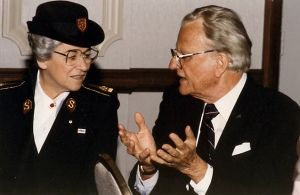 General Eva Burrows speaks with the Reverend Billy Grahm during her time as the world leader of The Salvation Army.
General Eva Burrows speaks with the Reverend Billy Grahm during her time as the world leader of The Salvation Army.
Her time as General was to see some significant and crucial changes in the operations and administration of The Salvation Army, both in England and internationally. One of the highlights of her term was the re-entry of The Salvation Army into Eastern Europe. Banned in Russia since 1923, Eva oversaw the return of The Salvation Army, not only to Russia but also to many other European countries that had been under Communist domination.
A move by other Salvation Army leaders around the world saw Eva extend her time as General to seven years. With two years to go before her retirement, Eva set out her agenda that included stabilisation of the work commenced in Eastern Europe.
On 8 July 1993, Eva retired from her position as General of The Salvation Army and returned to Melbourne as her new home. In her retirement, she practised what she preached, becoming involved with Major Brendan Nottle in the 614 Corps in the inner city. Regardless of the advancing years, she sought to make a significant contribution to the corps; her philosophy, in her own words: “Well, one thing I really hope is that I get promoted to glory and die with my boots on.”
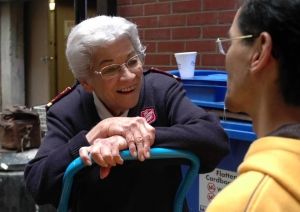 Eva found people fascinating and continued to serve in a voluntary capacity in Melbourne during her retirement.
Eva found people fascinating and continued to serve in a voluntary capacity in Melbourne during her retirement.
During her career as a Salvation Army officer, Eva Burrows had become truly a citizen of the world. Over her lifetime, many honours were bestowed on her, including the Order of Australia. She had rubbed shoulders with other world religious leaders, prime ministers, presidents and kings, yet had maintained an authentic relationship with the common people. Only time and eternity will reveal the true impact and value of the girl from a humble home in Tighes Hill.
General Eva Burrows was promoted to glory from Melbourne on 20 March 2015, aged 85. Major Nottle paid tribute, saying: “General Eva Burrows was the absolute epitome of what it means to be a true Salvation Army officer.”
When questioned about her life as an unmarried Salvation Army officer, she responded: “I think God has given me so much more, and although I didn’t have one person with whom to share all my decision-making and all the problems that I faced, I had family all around the world. The Salvation Army was my family. And the people were my children.”
Perhaps, in many ways, that summed up the real Eva Burrows.
*Article republished from the special Australian edition of the magazine 150 Years of The Salvation Army (2015).
Comments
No comments yet - be the first.